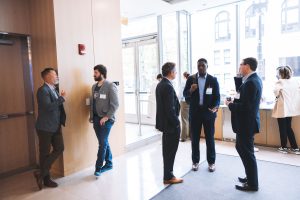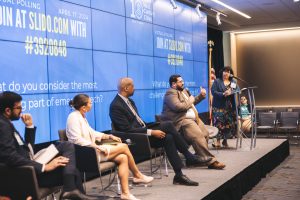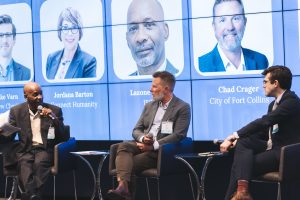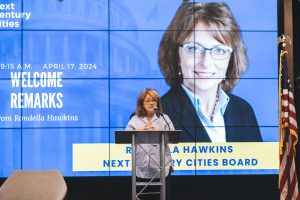By Corian Zacher ![]()
![]()

Last month, Next Century Cities convened in DC, hosting Bipartisan Tech in-person for the first time since 2020. Local officials and community organizers from Texas, Colorado, Ohio, Kansas, Maryland, and Kentucky joined NCC for a two-day Bipartisan Tech event that included a day on Capitol Hill and a policy conference at the National Association of Counties.
The Future of Civic Technology
Khotan Harmon, Sr. Program Manager for Telecommunications and Regulatory Affairs for the City of Austin, Texas, moderated a keynote panel on Building the Future of Equitable Technology, where local leaders from Louisville, Kentucky, and Baltimore, Maryland, joined advocates from Public Knowledge and the Open Technology Institute. Panelists agreed that forward thinking about emerging technologies requires local leaders to think three to five years ahead. ![]()

Taylor Carter-Disanto, Deputy Director of Broadband and Digital Equity, City of Baltimore, Maryland, explained that from a city government’s perspective: “you can’t just adopt technology for the sake of adopting technology. You’ve got to lay out what that purpose is and what you hope to gain from implementing it.”
Ricky Santiago, Digital Inclusion Manager for Louisville, Kentucky, explained that instead of responding after technologies are deployed, local government leaders working on innovative city planning need to deploy offensive strategies for emerging technology.
Read more in Government Technology’s article about the panel AVs May Not Have Taken Over, but Their Tech Is Here to Stay.
Planning Today for Success Tomorrow
A panel moderated by Jake Varn, Associate Manager of the Broadband Access Initiative for the Pew Charitable Trusts focused on how the City of Fort Collins, Colorado, and nonprofit organization, IBSA, based in Kansas, are preparing for upcoming funding opportunities. Panelists agreed that community-centered strategies are essential for long-term affordability plans.
Lazone Grays, President & CEO of IBSA, explained the strategy that he and nonprofit allies used to encourage the State of Kansas to include digital equity in its American Rescue Plan Act (ARPA) funding plans.  Along with $83.5 million for Broadband Infrastructure from the ARPA Capital Projects Fund, Kansas was one of seven states to receive for Digital Connectivity Technology and one of 24 states and territories to receive funding for Multi-Purpose Community Facilities.
Along with $83.5 million for Broadband Infrastructure from the ARPA Capital Projects Fund, Kansas was one of seven states to receive for Digital Connectivity Technology and one of 24 states and territories to receive funding for Multi-Purpose Community Facilities.
Chad Crager, Broadband Executive Director for the City of Fort Collins, Colorado, elevated the importance of building City-County partnerships to make the most of the federal government’s historic investment in broadband infrastructure and digital equity. Along with providing 19,000 customers in Fort Collins with affordable fiber-to-the-home service, the City is now looking to bridge the digital divide between urban and rural residents in Larimer County through partnerships with neighboring communities.
Honoring a Legacy
Next Century Cities Board Member, Rondella Hawkins, retired earlier this year after 30 years of public service for the City of Austin, Texas. Rondella has been a driving force for digital inclusion in the city,  responsible for implementing the City’s Digital Inclusion Strategic Plan to ensure that all Austin residents have the broadband they need to participate in society among other critical connectivity initiatives. Likewise, Rondella has shared her expertise with neighboring local leaders in Texas and with NCC’s nationwide network. The NCC team was delighted to celebrate with Rondella at Bipartisan Tech and looks forward to continuing collaborations in the next phase of her career.
responsible for implementing the City’s Digital Inclusion Strategic Plan to ensure that all Austin residents have the broadband they need to participate in society among other critical connectivity initiatives. Likewise, Rondella has shared her expertise with neighboring local leaders in Texas and with NCC’s nationwide network. The NCC team was delighted to celebrate with Rondella at Bipartisan Tech and looks forward to continuing collaborations in the next phase of her career.

